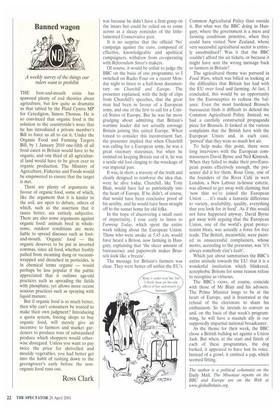Banned wagon
A weekly survey of the things our rulers want to prohibit
THE foot-and-mouth crisis has spawned plenty of cod theories about agriculture, but few quite as dramatic as that tabled by the Plaid Cymru MP for Ceredigion, Simon Thomas. He is so convinced that organic food is the solution to the countryside's woes that he has introduced a private member's Bill to force us all to eat it. Under the Organic Food and Farming Targets Bill, by 1 January 2010 one-fifth of all food eaten in Britain would have to be organic, and one third of all agricultural land would have to be given over to organic production. The Ministry of Agriculture, Fisheries and Foods would be empowered to ensure that the target is met.
There are plenty of arguments in favour of organic food, some of which, like the argument that it is kinder to the soil, are open to debate, others of which, such as the assertion that it tastes better, are entirely subjective. There are also some arguments against organic food: animals bred in wholesome, outdoor conditions are more liable to spread diseases such as footand-mouth. 'Organic' food — the organic deserves to be put in inverted commas, since all food, whether freshly pulled from steaming dung or vacuumwrapped and drenched in pesticides, is in chemical terms organic — would perhaps be less popular if the public appreciated that it outlaws age-old practices such as spreading the fields with phosphate, yet allows more recent noxious practices such as spraying with liquid manure.
But if organic food is so much better, then why can't consumers be trusted to make their own judgment? Introducing a quota system, forcing shops to buy organic food, will merely give an incentive to farmers and market gardeners to produce tons of substandard produce which shoppers would otherwise disregard. Unless you want to pay twice the price for shrivelled and mouldy vegetables, you had better get into the habit of rushing down to the greengrocer's early before the nonorganic food runs out.
Ross Clark


































































 Previous page
Previous page